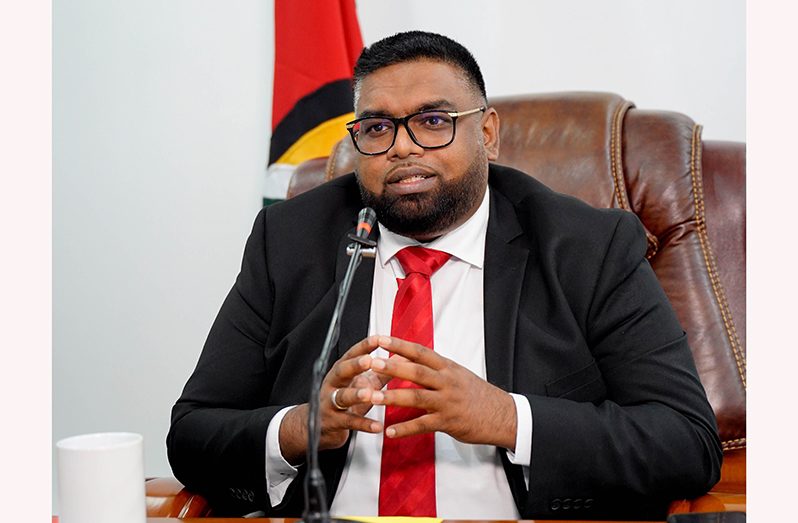-President Ali tells urban forum
DESPITE the challenges associated with urbanisation, Guyana has managed to successfully address this issue by employing deliberate planning and a comprehensive policy framework, President Irfaan Ali said on Tuesday. The Head of State who was at the time delivering the keynote address at the opening ceremony of the Caribbean Urban Forum (CUF) 10th international conference, said that other countries should use Guyana as a model when attempting to manage urban environments.
In acknowledging the significant challenge urbanisation poses to the Caribbean, he emphasised that a sustainable approach to urbanisation through structured systems is imperative in producing long-term solutions. He said a government’s response to urbanisation will undoubtedly determine the quality of life citizens will experience as well as how successful the country would be in achieving the Sustainable Development Goals (SDGs). He noted that there must be a common pathway through which urbanisation reflects the attainment of the SDGs.
“In Guyana, for example, we have been successful in addressing urbanisation. The available statistics show that between 1992 and 2011, the degree of urbanisation reduced continuously. Our success during this period was by no means accidental but was due to deliberate efforts by the Government of Guyana to embark on an ambitious housing programme, where over 100,000 house lots were distributed, and several housing schemes were developed as new growth poles,” he stated.
Further, the president noted that “the examination of new growth poles, the features of new growth poles and the opportunity that new growth poles offer us as urban and regional planners cannot be understated”.
President Ali, who holds a Ph.D. in Urban Planning, explained that Guyana’s robust housing programme was rooted in an organic National Development Strategy (NDS), predicated on objectives that were bolstered by policies articulated in the Poverty Reduction Strategy Papers (PRSP) I & II.
“Under the Poverty Reduction Strategy, the Government pursued numerous interventions which sought to: divest land to eligible Guyanese; provide infrastructure for new housing schemes and improve existing infrastructure in squatter settlements; regularise squatter settlements; facilitate access to finance by low-income earners through amendments to the New Building Society Act and the Income Tax Act; facilitate community participation in sustainable settlements development and prepare development plans for new towns and upgrade existing towns, consistent with the framework for Urban Development, elaborated in the NDS (2001-2010),” President Ali stated.
Those national policies, he noted, were backed by significant fiscal support from the government between 1992 and 2015 and were supplemented by an operational manual for housing that emphasised all the critical dimensions of sustainable development, including social development, economic development, environmental preservation, and good governance.
Due to these efforts, Guyana not only witnessed a reduction in rural-urban migration and the lowering of its urban footprints between 1992 and 2015 but saw accelerated development in rural areas and the attainment of several MDGs. President Ali explained that apart from sparking his interest in urban planning, the success of Guyana’s efforts to promote balanced development spurred his decision to pursue his Ph.D. at the University of the West Indies.
LEADERSHIP
Speaking to the integral components of successfully addressing urbanization, President Ali highlighted the importance of transformational leadership, noting that it is the most important aspect of a government’s vision for local urban transformation.
He noted that leadership must come up with innovative government policies to aid in this transformation. One such recent decision taken by government is the expansion of e-services to provide a smoother and more efficient experience. He spoke to government’s move to a Single Window Approval System, allowing for electronic transmission of building permit applications approvals and issuances, which would significantly reduce the time required to attain a permit.
Additionally, President Ali noted that necessary capacity must be developed through education to ensure sustained development in achieving sustained urbanisation. He noted that in light of this government will be engaging UWI and the University of Guyana (UG) to be part of the “transformational agenda” in the various areas identified.
He emphasised that as countries grapple with planning and managing their urban environments, it is imperative to recognise that those efforts may not be properly sustained over the long term or may be doomed to failure without requisite technical and professional capacity.
“It is crucial that the necessary capacity is developed to effectively and efficiently manage urban change at all levels of urban planning and governance. I urge that more attention be given to professional training and capacity building in urban planning and environmental management,” he said before adding:
“My government is fully supportive of training and educating a new cadre of professionals that will be masterfully equipped with the essential skills and competencies to deal with our complex urban challenges. The recently launched Guyana Online Academy of Learning, a free online 20,000 scholarship initiative, is tangible proof of my government’s commitment to attaining this objective.” Regarding urban resilience, President Ali highlighted government’s commitment to creating suitable urban development policies that will influence key considerations when undertaking planning and expansion and fostering better urban resilience in an era of rapid change and transformation of urban areas.
He underscored the importance of continued professional networking and the importance of those in the field continually engaging in professional growth and the sharing, exchanging, and cross-fertilization of ideas and best practices in urban planning and development.



.jpg)











